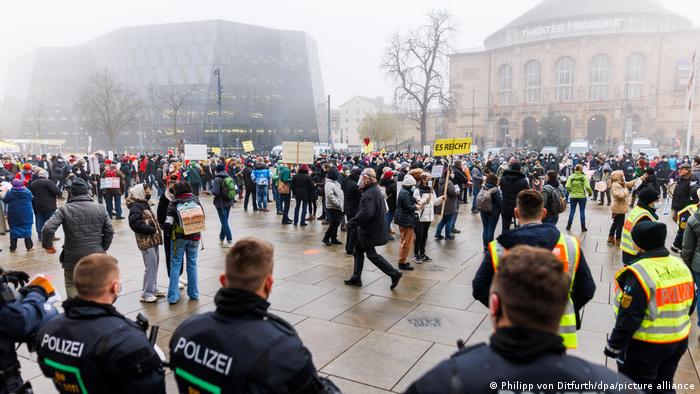
State and federal Lawmakers in Germany are exploring a sweeping set of measures to save energy, from turning off street lights to lowering building temperatures; and they are pleading with the public to cut consumption at home.
Whether those efforts spur a call to solidarity or a call to arms won't become clear until the cold sets in and bills come due. Yet Chancellor Olaf Scholz is not in a wait-and-see mood, telling public broadcaster, ARD, last month that spiraling heating costs are a "powder keg for society."
In explicitly naming the elephant in the room, the chancellor and his government are on the hook for nipping social unrest in the bud.
"In using this 'powder keg' narrative, the chancellor is trying to make way for key decisions," Ricardo Kaufer, a professor of political sociology at the University of Greifswald, told DW. "So all actors who could potentially stand in the way of measures are cajoled into compromise."
In other words, Scholz is signaling to his governing partners, political opposition, business leaders, and civil society that they bicker over policy responses at the country's peril.
This is a "lesson learned" from the pandemic, Kaufer said, when lawmakers often seemed unprepared to contain it, despite scientific predictions on how and when the virus would spread. Their communication was more often reactive than proactive.
The Bundestag, the German parliament, has already passed legislation that hopes to insulate society's most vulnerable from price shocks. At the same time, German utilities will be allowed to pass some of their increased costs onto consumers.
In crafting policy, officials are walking a fine line. They want to help secure household finances, especially for low-wage earners, but not so much that they undermine the incentive to save energy.
More relief may follow the summer recess, however agreement on what that looks like, how much it will cost, and how it will get paid for is likely weeks away, at least.
The smallest of the parties in the governing coalition, the neoliberal Free Democrats (FDP), control the finance ministry, which gives them significant power of the purse. Its minister, Christian Lindner, has made clear he intends to use that power sparingly, as he stands up for his party's values of low tax, low spending, and low regulation.
The FDP's bigger partners, Scholz's center-left Social Democrats and the environmentalist Greens, are pushing for a more generous helping hand.
Even if the government gets the measures right, they could still get the messaging wrong, which political scientists say can be just as important in steering public sentiment. As the pandemic showed, money and resources are only half the battle; clear and consistent communication is the other half.
"Perceptions are decisive," Evelyn Bytzek, a professor of political communication at the University of Koblenz-Landau, told DW. "Ultimately, we all act based more on what we perceive to be true than what is true."
Symbolism is a powerful tool in maintaining public support, Bytzek said. She pointed to Gerhard Schröder's visit to flood-stricken parts of eastern Germany in 2002, which gave him a boost in his reelection campaign for chancellor. He went onto win a few weeks later.
Scholz won last year's election in part due to his Merkel-like passive leadership style. Now that could become a liability — and stoke unrest — if the public feels their ship of state is without a captain at the helm with an iceberg ahead.
"Crisis is not just a danger, but also an opportunity to generate more trust when crisis management is well perceived," Bytzek said.